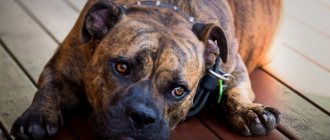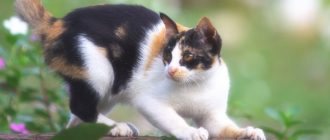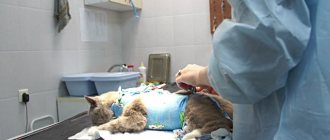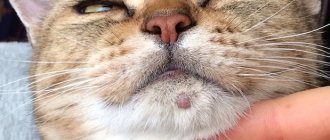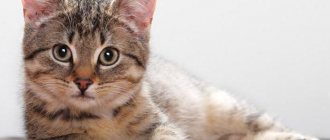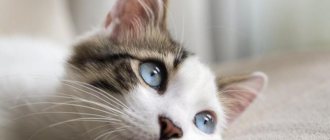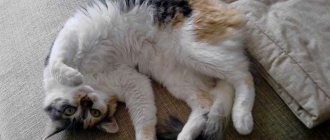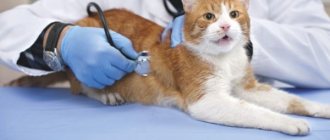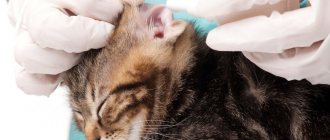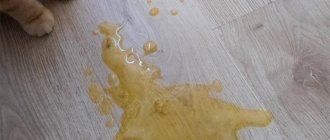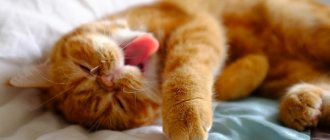Why is my cat's stomach churning?
While petting a cat, you can often hear a grateful purr.
But from time to time the cat's stomach gurgles. This sound amuses some, but alarms others. A loving owner immediately asks himself the question: is this a symptom of a digestive disease? And what should you do if your cat’s stomach is rumbling? There can be many reasons for this rumbling in the stomach :
- The pet feels hungry.
- Binge eating.
- Aerophagia.
- Worms.
- Thirst.
- Flatulence.
Both people, cats, and dogs have stomachs that growl loudly from hunger. As soon as the pet is fed, these sounds go away.
Cats often spend entire days alone and become very hungry in the evening. Then the owner returns from work and tries to feed his furry friend more thoroughly. Cats do not always know when to stop and often overeat. The animal’s digestive system cannot cope with the large volume of food that has arrived in a short period of time. All this can provoke not only rumbling in the stomach, but also diarrhea. The cat may begin to vomit. The intestines and stomach cannot digest the entire volume of food, and it begins to rot. This can result in food poisoning, severe indigestion and cause diarrhea in the cat.
Aerophagia means "eating air." If a cat greedily pounces on food, then it can swallow a lot of air along with the food. Some of the air escapes when belching, but some remains and descends into the intestines. This gives rise to rumbling in the animal’s stomach. Aerophagia is often confused with flatulence due to the similarity of symptoms. But aerophagia does not pose a threat to the cat’s health, unlike flatulence. You just need to feed the animal in small but frequent portions. This way you can avoid overeating and swallowing air.
The stomach is also rumbling because of worms. But in addition to this symptom, others will be present: a swollen and pear-shaped stomach, diarrhea. With an advanced helminthic infestation, the animal is very thin, the ribs and feces are palpable and yellow-green in color. Worms eat food faster than the intestines and stomach, leaving behind only gases and toxins in large quantities. It is these gases that cause rumbling in the stomach. The animal must be treated immediately, otherwise it may die quickly.
Not only hunger can provoke rumbling in a cat’s stomach. Water entering an empty intestine can also make similar sounds. Especially if the cat has drunk a lot of liquid. Then the characteristic “gurgling” appears. Strong intestinal peristalsis and rumbling also occur when the cat drinks cold water. Cold liquid irritates the intestinal mucous membranes. It begins to contract intensively . The air bubbles in it begin to move intensely and the stomach growls. In addition to the fact that your stomach growls, it can also hurt. The cat may develop diarrhea. Therefore, it is better not to give cats cold liquids and food.
Cats, like people, also suffer from flatulence. Its symptoms are very unpleasant: bloating, rumbling in the stomach, unpleasant smell from the cat, pain. In very severe cases, intestinal volvulus occurs, although cats are not very prone to this. With flatulence, a cat's stomach can become so full of gases that it becomes difficult for the animal to breathe and drooling may occur.
The causes of this pathology:
If everything is clear with overeating, then questions may arise with food. Cats do not like spoiled food, although they may eat something that has spoiled, causing their stomach to rumble. But if a cat receives high-quality food, but its stomach is still rumbling, you need to reconsider the components of its food. For example, milk, so beloved by all cats, is not digestible by them.
This is what causes bloating in the stomach. Adult cats and cats lack the enzymes that break down and help digest milk. Excess cereals, salt and fat in animal food also lead to bloating.
These are the main reasons why a cat’s stomach rumbles. A stomach problem can seriously affect your pet’s health, so it’s best not to delay a visit to the veterinarian.
Why is he purring?
Good afternoon A little about your cat.1. Gender female, age 18 years, weight 3.1 kg (lost weight, was about 4.5 kg)2. Spayed at the age of 9 years (a benign tumor on the nipple was removed). Also, at the age of 17.5 years, another benign tumor on the nipple was removed.3. I have not had any vaccinations4. For worms and fleas I gave drops on the withers of “Helminthal K” (moxidectin and praziquantel) about 3 months ago.
Also fiprist (fipronil) about 1 month ago.5. I force-feed Royal Canin Age 12 wet food (non-medicated food for older cats) using a syringe. Now I have switched to wet Royal Canin Gastro Intestinal (medicated food for cats with stomach problems).6. There is no way to measure the temperature right now.
I'll measure it at the vet one of these days.7. The cat doesn’t want to eat on its own, so I force-feed it with a syringe. This problem with her has been going on for about a year (!) since 06.2016, sometimes the cat gets better, sometimes worse. A year ago I went to the doctor with the problem of “poor appetite” and was diagnosed with “early stage chronic renal failure.” I started force-feeding with a syringe wet Royal Canin Renal (1/3 sachet at a time, a total of 1.6 sachets per day, keeping intervals between feedings of at least 3 hours) After about 7 months (02.
omeprazole, quanimatel, Maalox gel, and also to increase acidity - panzinorm. They didn’t give any results! I didn’t feed the cat pills, I observed the doses and intervals between doses to make sure that this pill was not suitable. The problem was solved literally as soon as I started feeding him (albeit again by force) Royal Canin Gastro Intestinal wet food.
I fed Royal Canin Gastro Intestinal food for about 1 month. The cat always had problems with pooping - almost diarrhea, soft poop. Apart from almost diarrhea there were no problems. I switched to Royal Canin Age 12 wet food from a syringe, pooping became normal, no symptoms. Around 05/2017 a strong rumbling appeared (!
) in the cat’s stomach, it doesn’t seem to bother the cat much, but it rumbles a lot. Mainly after meals, but often on an empty stomach. I tried to give Espumisan L - it doesn’t help at all, I’m in shock, the rumbling hasn’t become a bit less, the dosage is 15-20 drops for each meal, up to 50 drops a day.
I changed the food again to Royal Canin Gastro Intestinal drops of espumisan, the rumbling decreased, but not much. I also have problems with stool - pooping liquid, pooping on my bed when I didn’t have time to clean the toilet ((Currently I’m feeding Royal Canin Gastro Intestinal without drops of espumizan and I’m thinking what to do next.
I will definitely go to the vet, but I need your advice: 1. What tests does your cat need to undergo? We need names. I'm afraid the veterinarian will forget to say something in the laboratory and it will be in vain that I will torture the cat by donating blood.2. When I go to the veterinarian, what should I ask to do: take the temperature, do an ultrasound of the abdominal cavity - I’ll tell you exactly what else is needed?
I want my visit to the vet to be as productive as possible because... This is a lot of stress for the cat and for me. I’m looking for advice from you on how to help the cat, what treatment tactics, what to feed. Now, it’s hard for me to force feed my cat, because... I’m not at home for 12 hours at a time, so I feed her in the morning, evening and night, only about 1.3 sachets per day.
The well-known “skill” of cats is purring. This is what you hear when you pet your pet and play with him. But sometimes cats “confuse” their owners with other sounds that can hardly be called “characteristic” of these animals. For example, rumbling in a cat’s stomach may look funny, but for many breeders, especially not very experienced ones, it can cause anxiety: is this phenomenon a harbinger of some serious digestive pathologies? Let's figure this out!
If you have ever experienced the feeling of “sucking” hunger at least once in your life, then you are probably familiar with the rumbling of your stomach firsthand. In such cases, this phenomenon indicates an empty digestive tract. This is how the body “hints” to its owner the need for a good meal. So it is in the case of a cat.
But! Sometimes a “hurricane” in your pet’s stomach indicates the exact opposite situation, that is, overeating. In the modern world, it is not uncommon for a cat owner to spend almost the entire day at work, returning only late in the evening. And it’s good if there are household members who can feed a hungry sufferer.
Otherwise, the cat, having received its portion of food, greedily pounces on it, and then begins to beg for more. No wonder he overeats a lot. Grumbling and other strange stomach sounds in such situations are only a consequence of the inability of the digestive system to cope with the “happiness” that has fallen on it.
And the “roars” of the stomach are a trifle. If a cat has eaten so much that its gastrointestinal tract cannot digest it all properly, the food masses simply begin to rot and deteriorate. All this can lead to either severe food poisoning or serious indigestion. “Thunders and lightning” in the stomach of an overeating cat is a sure sign of impending diarrhea.
Another phenomenon is closely related to excessive gluttony. It's called aerophagia. Translated, this literally means “eating air.” If a cat eats greedily, he simultaneously swallows a lot of air (sometimes so much that bloating develops). Part of it comes out through belching, and the rest goes deep into the intestines, where it produces rumbling and roaring sounds.
We suggest you familiarize yourself with: Do-it-yourself stable stall in the stable
Subsequently, the air comes out quite naturally, which is why aerophagia is often confused with flatulence. But, unlike gases in the intestines, it does not pose any particular danger. So what to do? Just try to feed your glutton more often, but in smaller portions. Then the cat will not swallow such volumes of air, and the problem will solve itself.
Causes of a rumbling stomach in a cat
The main causes of rumbling in the stomach in mustachioed striped animals:
- First of all, it is hunger . An empty intestine makes sounds when all the food has already been digested. It’s very easy to rid your pet of rumbling – it’s time to feed. Immediately after a hearty snack, the rumbling will stop.
- Disturbed feeding regime. In cases where the owner, before leaving for work, forgets to leave the pet a sufficient amount of food, the cat manages to become too hungry. As a result, he overeats in the evening. A sudden load causes the gastrointestinal tract to become more active. The rapid process of digesting food, absorbing nutrients and moving unnecessary ballast through the intestines begins. Rumbling in this case is absolutely normal.
Causes of rumbling and seething
Increased gas formation causes serious discomfort in animals. Its reasons can be simple, for example, a change in food or a transition from natural food to artificial food, mixed nutrition.
In young kittens, dyspepsia often develops if the cat eats artificial food and drinks mother's milk. A kitten may have dyspepsia due to congenital lactose intolerance. Such kittens need special nutrition. Otherwise they will die.
Quite often, a cat develops dyspepsia even when fed high-quality food from well-known brands, since these foods contain a lot of preservatives and fiber, and dry food contains a lot of drying agents and flavorings.
Unfortunately, dyspepsia caused by such foods is not the worst option for your pet.
The cause of active seething in the stomach can be very serious illnesses.
The cause of rumbling and seething in the animal’s digestive system can be serious diseases of the organs involved in digestion, bacterial intestinal infections and severe viral diseases of the cat.
Inflammation of the pancreas often leads to enzymatic deficiency and, as a result, fermentative dyspepsia. If the animal's bowel movements are abnormal, vomiting occurs, the animal is bothered by nausea, and refuses to eat - this may be a manifestation of pancreatitis.
If the animal has a bloated abdomen, purulent rhinitis and conjunctivitis, high fever and general weakness, it is bothered by flatulence, accompanied by strong rumbling in the stomach, it may have a viral infection that is severe for a cat (calcivirosis or rhinotracheitis).
Peptic ulcers of the stomach and duodenum, gastritis, colitis, enteritis, intestinal dyskinesia - all these diseases can be accompanied by rumbling, because the process of digesting the bolus of food and moving feces is disrupted. Usually these diseases are accompanied by stool disorder and other symptoms unpleasant for the animal.
Inflammatory processes in the mucous membrane of the gastrointestinal tract, indigestion, and rumbling can be caused by certain medications (anti-inflammatory, hormones, and others).
Aerophagia, caused by stress or other reasons, can lead to rumbling in the animal’s stomach. At the same time, his abdomen is swollen, and upon palpation the abdominal wall is tense.
What is aerophagia
This concept means large volumes of air entering the stomach. As a result, unpleasant sensations appear. The structural features of the cat's body do not allow for effective removal of excess. Responsibility for removing air falls on the intestines. That's why the violent rumbling in the stomach begins.
To reduce the amount of air swallowed, you need to feed little and often.
Cats should regulate the processes and frequency of food intake themselves, especially if there are no problems with excess weight. It is most convenient to use dry food in combination with a bowl of clean water.
Worm infestations
Mild forms may not be noticed, but severe forms are easily diagnosed by a number of symptoms:
- pear-shaped swollen belly;
- yellow-green color of stool;
- excessive thinness;
- frequent diarrhea.
Worms eat food faster than it can be digested. During their life, parasites emit a large amount of gases and toxins, which provoke active seething.
Treatment methods. If this problem exists, the animal must be treated. A veterinarian or a specialist at a pharmacy for animals will help you decide on the best method. Today, many dosage forms are available:
- suspensions or pastes - the kit usually includes a syringe with which you can take the required amount and squeeze it over the animal’s cheek;
- drops - they are intended for external use to combat fleas, which can significantly worsen the quality of life of a pet;
- tablets are a concentrate for preparing a medicinal solution; in their pure form it is difficult to force a cat to swallow them (read more about how to give a cat an anti-worming tablet).
All these means provide quick and complete elimination of parasites. What type of medication to choose depends on the individual characteristics of the pet.
After treatment, you need to ensure that the cat does not come into contact with stray animals.
How are grumbling and worms related?
In the most direct way, no matter how strange it may seem. Perhaps you have seen mangy and disheveled kittens with oversized, swollen bellies? If so, then you are “lucky” to observe the main visual sign of toxocariasis: a swollen and pear-shaped abdomen with severe general exhaustion of the pet. You can easily verify this by stroking the animal in the chest area. You can easily feel the ribs protruding from under the skin. A sick kitten often has diarrhea, and the excreted feces have a greenish-yellowish color and an unbearably disgusting smell.
Food
There are a number of foods that provoke a rumbling stomach in a cat:
- Milk . One of the most controversial issues among pet owners is the consumption of milk. Some of them are of the opinion that it is completely unnecessary for adult animals and can only cause harm. Others believe that everything is exactly the opposite. Therefore, the owner himself must decide, taking into account the pet’s relationship to milk and the general reaction of the body. If you have previously consumed this product regularly, you can try temporarily eliminating it from the menu. If the rumbling problem resolves itself, the cause will be obvious.
- Water. Excessively cold liquids irritate the walls of the stomach and intestines. Therefore, it is unacceptable to pour water from the tap and immediately give it to your pet. You should collect it in a clean container in advance and give it time to warm up and settle. In many cities, water is chlorinated to prevent the risk of the spread of dangerous infections. But long-term settling and heating to room temperature allow the chlorine to evaporate successfully. Chlorine is a gas in structure. During the interaction, atomic oxygen is released from the water molecule to form a small amount of hydrochloric acid. This substance, unlike ordinary oxygen, very actively kills harmful bacteria.
Eliminating all of the above reasons and provoking factors will normalize the pet’s condition and prevent possible problems in the future. If nothing helps, then the way to solve problems is to contact an experienced veterinarian.
Symptoms and treatment of exacerbation of chronic pancreatitis
The doctor personally told me to buy Espumisan before the ultrasound examination, where I need to drink it two to three times a day for three days. I won’t say that it acted on me as a carminative, although this is in the instructions, everything was stable as usual every day, I didn’t have any problems here.
Having bought the package, I read the instructions and saw that the drug helps with bloating, which happens to me sometimes. I work shifts and my meals are definitely not according to the schedule, and this is probably why I have bloating, which interferes with and hinders my movements, but this is not at all necessary at work. After drinking two small capsules, after 20 minutes the feeling of bloating goes away completely - at least sit down and eat again, everything is fine and you’re in a working mood right away.
Espumisan has no contraindications at all, which is of course a big plus and is suitable even for babies, albeit in the form of droplets. I didn’t try it on children; I managed with other drugs at that time.
The price is really not exactly cheap - 330 rubles today, and there are only 25 capsules, if you take two or three at a time, it won’t last for ten days. To save money, I looked for an analogue and this is simple activated carbon, with exactly the same spectrum and effect on the body, it removes bloating and gas formation, although not so quickly. Well, it’s problematic to give activated charcoal to babies, and espumizan is not even absorbed into the intestinal walls and this is another advantage.
>I have a hurricane in my stomach, what should I do?
We suggest you read: Soil for an aquarium - a description of the species, how to choose the right natural and artificial
To avoid having to treat exacerbation of chronic pancreatitis, doctors recommend taking measures to prevent the development of this pathology. First of all, it is necessary to study the main causes that provoke acute inflammation of the pancreas and avoid them as much as possible. In most cases, exacerbation of the disease does not require mandatory surgical intervention, but neglecting conservative treatment, there is a risk of serious complications in the form of problems with the digestive process and absorption of substances in the body.
If the doctor's instructions are not followed, exacerbations of chronic pancreatitis are possible.
- 1 Why does the disease worsen?
- 2 Disease code according to ICD 10
- 3 Main symptoms
- 4 How long does an attack last?
- 5 How does the acute period proceed?
- 6 Diagnostics
- 7 Treatment of the condition 7.1 General rules
- 7.2 Taking medications
- 7.3 Folk remedies
- 7.4 Diet
A disease such as chronic pancreatitis is a progressive inflammatory process in the pancreas, which gradually leads to the organ becoming overgrown with tissue that is unable to fully perform its functions. The pathology can occur in both adults and children. The pancreas can become aggravated for the following reasons:
- excessive alcohol consumption;
- tendency to overeat;
- smoking;
- dysfunction of the biliary tract;
- excess weight;
- regular stress;
- excessive consumption of fat;
- infectious diseases.
The unified international classification ICD 10 is of great importance in medicine, as it allows the exchange of experience in treatment and diagnostic examination among specialized specialists in different countries. The ICD 10 code for chronic pancreatitis is as follows:
- K86.0 - alcoholic chronic pancreatitis.
- K86.1 - other chronic pancreatitis (infectious, recurrent and of unknown etiology).
Main symptoms
How does chronic pancreatitis manifest in the acute stage? The distinctive signs of this disease are severe pain in the left side. If the entire organ tissue is affected, the pain is localized in the lower back and can radiate to the shoulder blade or back. Thus, the main symptoms of chronic pancreatitis are as follows:
- swelling of the pancreas;
- abdominal pain on the left side;
- accumulation of biological fluid in the abdominal cavity;
- pain in the stomach.
In addition to the above symptoms, the following signs may indicate that pancreatitis has worsened:
- increased body temperature;
- vomit;
- nausea;
- diarrhea;
- cyanosis of the skin;
- burning in the esophagus;
- decreased appetite;
- flatulence.
Chronic pancreatitis in the acute phase can be accompanied by severe pain and a significant deterioration in health. However, not all patients experience such severe pain, but instead they suffer from other symptoms: lack of appetite, high fever, vomiting, diarrhea, etc. But how long does the acute phase last?
The chronic form of pancreatitis lasts until the end of life and does not respond to any treatment. Sometimes exacerbations occur, but in all patients they occur at varying frequencies. When you give up bad habits and follow the prescribed diet, pancreatitis becomes worse extremely rarely. But when patients neglect preventive measures and continue to lead their previously familiar lifestyle, the disease progresses and leads to a severe stage of acute pancreatitis. The patient's condition worsens significantly, symptoms of collapse and toxic shock arise. Signs of collapse are as follows:
- oxygen starvation;
- a sharp drop in blood pressure;
- general weakness;
- decrease in body temperature;
- dizziness;
- cold sweat;
- pallor of the skin.
Diagnostics
Before you begin to treat an exacerbation of the inflammatory process in the pancreas, it is necessary to conduct a diagnostic examination. To make an accurate diagnosis, a specialized specialist will need the results of the following studies and tests:
- X-ray, which will reveal calcification in the tissues of the organ.
- Urine tests to determine the presence of amylase.
- Analysis of stool for the presence of undigested fiber.
- Blood tests, which include a general clinical analysis and biochemical analysis. Based on the results, an increase in leukocytes, ESR and enzyme levels are determined.
- Ultrasound examination to examine the size of parts of the gland.
- CT scan. Carrying out this type of diagnosis reveals the degree of fibrosis.
Treatment of the condition
What to do when pain appears in the pancreas during chronic pancreatitis? First of all, this indicates its exacerbation and, as mentioned earlier, it is impossible to cure the chronic form once and for all, so therapy in this case is aimed at eliminating pain, normalizing the functioning of the pancreas and preventing possible complications. An exacerbation of chronic pancreatitis can be stopped with folk remedies and medications, and the patient is also prescribed a special diet.
When pancreatitis worsens, the patient immediately requires fasting, with the help of which enzymes become less active and severe pain is reduced. In this regard, most patients are interested in how long it is necessary to abstain from eating? According to specialized experts, fasting must be maintained for 3 days, while the patient is allowed to drink water. It is mandatory to take medications in conjunction with fasting.
Why does a cat's stomach growl - 6 possible causes of the problem
If your cat's stomach is rumbling, it could be due to a number of different factors. Often this condition is triggered by a feeling of hunger, but there are situations when the cause is more serious. Pathologies of the digestive system and helminthic infestation can cause rumbling. That is why it is important for the owner of a pet whose stomach regularly gurgles loudly to contact a veterinary clinic.
What to do?
If gurgling in the abdomen is not provoked by pathologies, specific therapy for this condition is not required. It is enough for owners to protect the cat from stress. Then you need to change the diet, excluding from it the food that he prepares for himself. It is recommended to feed your cat natural food, but you can diversify the menu with industrial supplements. It is better to entrust the choice in favor of one of them to your veterinarian. Feeding the cat should be done indoors, where no one will disturb her. It is recommended to make smaller portions, but feed the animal more often. In order not to provoke food poisoning from spoiled food, the trash can must be installed in a place inaccessible to the cat.
Flatulence
We undeservedly forget one of the most important causes of stomach rumbling. This is “normal” flatulence. Almost every person is familiar with its manifestations, which create many problems in everyday life. In addition to the “roars” and the unpleasant odor emanating from the cat, flatulence is fraught with abdominal pain and even, in particularly serious cases, can lead to volvulus.
Why does this pathology occur? The first reason is the already mentioned gluttony. When a cat eats too much, the food in his digestive tract simply does not have time to be digested. This leads to the development of putrefactive processes in the thickness of semi-digested food masses, accompanied by the release of large volumes of gas and toxins.
Intoxication develops, the pet feels sick. But the cause of flatulence is still gases. Naturally, gases are only the least of all possible problems in such situations. The cat may either die or get severe food poisoning. If he's lucky, he'll get away with "just" severe diarrhea.
But what about pets who have never been noticed for gluttony, but are constantly developing flatulence? It is possible that it is not the cat who is overly fond of food that is to blame, but the food he eats. Firstly, it may simply be of poor quality. If this is the case, the food begins to rot in the cavity of the gastrointestinal tract and gases are released.
But cats are quite picky eaters, and therefore they will not eat frankly rotten food (unlike dogs, by the way). So why does a cat’s stomach growl loudly and why does it regularly “spoil the air”? The matter may be a food intolerance to some components of the food, or the cat’s body, in principle, cannot digest this or that food. An ideal example is milk. It just so happens that it is historically considered perhaps the best treat for cats, but this is far from the case.
As veterinary studies prove, the body of more than 65% of adult cats does not produce the enzymes necessary for the digestion and absorption of dairy products. Feeding such a pet with milk means dooming it to constant flatulence and bowel cries. If your cat cannot digest milk, do not try to “accustom” him to this food. Nothing good will come of such an undertaking; you yourself will only become the culprit of chronic eating disorders in your animal.
But that's not all! Many owners strive to reduce the cost of feeding their pet, which is why they give it food waste. There is nothing wrong with this, but you need to follow a few rules:
- First, watch the amount of salt in your food. Salted fish is a good addition to a holiday feast, but you don’t need to feed it to your cat. He may very well be poisoned.
- Secondly, you should not include too much cereal in your cat’s diet. Yes, they contain a lot of fiber that stabilizes the pet’s digestion, but cats are still “classical” predators; they have absolutely no need for fiber. At least in such quantities. It only irritates the mucous membranes of the intestines and provokes frequent trips to the toilet. Considering that the cat’s digestive system is far from “epic” in length, the food eaten does not have time to be properly absorbed, which in advanced cases of “dieting” leads to exhaustion.
- Thirdly, the food given to the cat should not contain too much fat. If the pet “grows” to the point of being a ball on legs, this will have a most detrimental effect on its health.
So you found out why and why a cat’s stomach growls. Since some predisposing factors for this phenomenon pose a potential danger to the pet’s health, it would not hurt to take her to the veterinarian. Perhaps your pet needs to seriously adjust its diet, and a veterinary nutritionist will help with this.
The cat's stomach is seething: reasons and what to do
Does your furry pet (or pet) have a churning stomach? At the same time, the cat clearly feels uncomfortable, strives for privacy, and its behavior clearly indicates an unhealthy state of health? Seething in the stomach can be a symptom of many diseases in cats: from a banal disorder due to poor quality nutrition to a serious helminthic infestation. Or, even simpler: the cat may just be hungry! And his stomach may be bubbling from hunger - just like in people. This is especially noticeable if the animal is fed strictly according to the clock. Before the next meal, there is a high probability that the cat will have a bubbling stomach.
To accurately determine the reason why a cat’s stomach is seething, it is necessary to consider the problem comprehensively, in close connection with other symptoms. So…
Diagnostics and therapy
To make a diagnosis, blood, urine and feces are examined, ultrasound and x-rays are done. During the examination, the veterinarian palpates and listens to the peritoneum. Depending on the results that explain why the cat has a hard stomach, the doctor decides what to do to normalize his condition.
Help with non-dangerous causes of bloating
Flatulence caused by poor nutrition can be eliminated by adjusting the diet. A ban is imposed on any products that increase gas formation (legumes, flour, fresh vegetables). Remember that milk is contraindicated for adult animals, as they develop lactose intolerance. To normalize intestinal function, your veterinarian may recommend a course of probiotics.
Excessive weight can be eliminated by reviewing your diet. The animal is prescribed less high-calorie food and the usual portions are reduced. Daily physical activity is complemented by joint games.
A big belly in a scared cat can be healed with time. Do not impose your affection and let your pet get used to the unfamiliar environment.
Treatment of the underlying disease
Surgery will be required to eliminate pyometra. During the operation, the veterinarian cuts out the uterus, that is, performs sterilization. Surgeries are also necessary to remove a tumor, intestinal obstruction, foreign object, or the consequences of severe trauma.
All infectious diseases are treated with antibiotics and antiviral drugs, and helminthiasis with anthelmintics. Intoxication with poisons is eliminated by administering an antidote and gastric lavage. In case of ascites, excess fluid is pumped out of the animal and a course of diuretics is prescribed.
To treat constipation, use Vaseline oil or laxatives. Such therapy is permissible only in the absence of intestinal obstruction. Otherwise, taking these drugs may cause intestinal rupture.
Treatment for an abscess depends on its complexity. Most often, drug therapy, which involves taking antibiotics and anti-inflammatory drugs, is sufficient. In case of extensive inflammation, the ulcers are removed by a surgeon.
Cholecystitis is treated with antibiotics and proper nutrition. The animal is transferred to a veterinary food that fights gallstones.
Any therapy must be carried out under the supervision of a veterinarian, with dosages clearly specified by him.
Features of digestion
This is probably the first thing to consider if you are concerned about your cat's rumbling stomach. The fact is that cats digest food quite actively over several hours, which may be accompanied by characteristic sounds. Therefore, if the “purring” does not show irritation, its behavior does not change and the seething process itself does not cause the cat absolutely any inconvenience, you should not pay attention to it and invent non-existent diseases.
What to do in this situation? Nothing. Just observe the behavior of the animal. If after eating the cat’s stomach is not just seething, but the cat is clearly experiencing discomfort, this may be the “first bell” of indigestion and gastric problems.
Gastrointestinal tract disorders.
In this section, we will look at some disorders or conditions that can affect digestion . One of them could be the reason why your cat is making these gurgling sounds:
- Foreign body although this is a more common problem for larger animals such as dogs, cats are also known to swallow objects they shouldn't. Foreign bodies such as strings, strings or plastic parts can interfere with your intestinal transit and cause problems. These are not just gurgling sounds. This can cause reflux, discomfort, or even bowel perforation. Therefore, if your cat is vomiting and has no appetite to make the gurgling sound worse, you should consult your veterinarian...
- Malabsorption is the medical term for the inability to properly digest food where nutrients should enter the bloodstream. There are several reasons for this phenomenon. In addition to stomach sounds, our cat may increase her food intake but maintain the same weight or even begin to lose something. The same can happen with some parasites. This usually occurs due to problems with the pancreas, but must be treated by a doctor...
- Indigestion Although more common in dogs, cats can also suffer from digestive problems. If a cat has easy access to rich food (such as a neighbor who likes to spoil other people's pets) or if it eats too much too quickly, it can cause stomach upset accompanied by loud bowel sounds. If food gets stuck, it can cause intestinal damage, which is not only noisy, but can also be very painful. Naturally, this may work, but chronic indigestion will require medical attention...
- Dysbacteriosis is when the flora of a cat's digestive tract is disturbed. The microbial action of this flora is disrupted and an imbalance occurs, which sometimes leads to an accumulation of intestinal flora, which can be problematic. If this happens, gurgling sounds are just one possible problem. If this balance is not restored naturally, a veterinarian should be consulted.
As we can see, if a cat's stomach is rumbling with gurgling or gurgling sounds before or after eating, it is probably not a cause for concern and will be corrected in no time. On the other hand, if those gurgling sounds from your cat's stomach are accompanied by vomiting, diarrhea, or any other signs of discomfort, you should take them to the vet.
Stomach is churning and vomiting
This situation indicates possible problems with the stomach and the process of excreting bile. Also, some indirect signs indicate serious disorders of the cat’s gastrointestinal tract, namely:
- Uncontrolled shedding.
- Stool disorder.
- Decreased appetite.
- Unreasonable screams throughout the day.
- Weight loss.
Thus, the cat tends to spend most of the day sleeping, his condition worsens and every meal causes stomach turmoil and vomiting.
The relationship between thirst and stomach grumbling
But not only by hunger! Sometimes the sounds made by your pet indicate his desire to drink, or that he has already managed to quench his thirst, having greatly succeeded in this . What does it mean? The fact is that with severe thirst, the intestines will make all the same sounds as if the cat was hungry. The lumen of the gastrointestinal tract in such cases is absolutely free, and therefore nothing interferes with the gases.
But when your pet gets well drunk, water will flow through its half-empty intestines, pushing forward all the same gas bubbles. The sounds of rumbling are interspersed with melodic murmurs. There is no need to worry: if your pet pretends to be a river stream, this phenomenon does not threaten its life and health.
Stomach is seething and stool is disturbed
Such symptoms indicate disruption of the intestines due to poor nutrition. Moreover, seething is observed in the lower abdomen, closer to the intestines. The stool is loose and there are no other symptoms.
What to do in this situation? Review the animal's diet. Completely exclude foods that are “heavy” for the stomach from your cat’s diet. These include raw and fried meat, fatty sour cream, and low-quality dry food. In order for the cat’s gastrointestinal tract to normalize, it is necessary to adhere to a gentle diet (broth, cottage cheese, light porridge with water, high-quality diet food). As a rule, symptoms disappear on their own after 3-4 days.
Stomach gurgles when poisoning is suspected
Many animals are free-range (especially if the cat lives in a private home). Thus, it is very difficult for the owner to monitor the animal’s proper diet. Even if at home the cat eats the best food or exclusively natural, fresh products, no one can guarantee that the cat will not pick up something on the road or eat a mouse (and rodents are carriers of many diseases). Poisoning can cause both a rage in the stomach and more serious consequences, including death.
What to do in this situation? The first thing to start treatment with is gastric lavage . It is necessary to induce vomiting in the cat as soon as possible, for which you can pour a weak solution of potassium permanganate or hydrogen peroxide into the mouth (0.5 teaspoon of peroxide per 3 kg of weight, diluted in a glass of water). If there is no vomiting, and the cat gets worse, it is necessary to perform gastric lavage at the veterinary clinic.
In any case, seething in a cat’s stomach is an abnormal situation and requires attention from the owner of the animal. If there are no other symptoms besides seething, there is no point in worrying. You just have to limit the animal’s food intake and keep the cat on a gentle diet. If other symptoms listed above are observed, the help of a qualified veterinarian is necessary.
Treatment
If the only manifestation of dyspepsia is loud rumbling along the animal’s intestines, then it should be:
- protect from stress;
- feed in small portions, but more often, in a specially designated place where no one will disturb the animal;
- you need to choose the right food, you can consult a specialist;
- if an animal eats artificial food, it is advisable not to spoil it with treats from your table, “human” food often provokes dyspepsia;
- trash cans should be kept out of the animal's reach.
If this strategy is not successful or additional alarming symptoms appear, you should definitely take your cat to the veterinarian.
